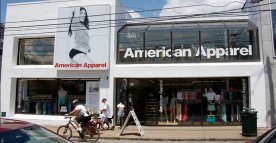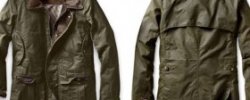| Back again to Press Archive
Manufactured in the U.S.A. San Francisco Bay Area ChronicleJenny Strasburg July 4, 2004 In a business better-known for dull uniformity than bold character, Dov Charney is a dynamo who has found success attempting to sell a not likely mix of T-shirts, sex and social duty. On the factory floor at American Apparel - the organization he runs simply outside the Garment District here - he's the noisy, lanky supervisor with mutton chops, a rock-star demeanor and an often-discussed love life that seems outsize even by Los Angeles standards. In a business that all but fled US soil for less expensive labor in other places, he's also the businessman who may have pledged his commitment to homegrown attire, above-average earnings and worker-friendly factory problems. On billboards plus magazines, Charney sells childhood and sex attraction packed in extra-soft, snug T-shirts. Through shrewd advertising, he has got commandeered an important slice associated with the market, infusing a top level of manner into a day to day closet product. The formula has brought American attire increasing sales and nationwide attention. Although question continues to be: Can he continue doing really and do-good? His advertising and marketing acumen could falter, his competitors could offer similar high-fashion tees at lower prices, and fleeting styles and tastes could shift. Force could develop to compromise the workplace ideals which he has built the company. "His targets are, very laudable, but i do believe lots of people in the market tend to be viewing to see if he's going to be able to endure, " claims Jack Kyser, main economist using la County financial Development Corp., an exclusive nonprofit that promotes jobs and business. Together with edgy, out-front picture, Charney does not appear to be a guy that is worried. He is a portrait in self-confidence, an unsubtle and quite often off-color business spokesman susceptible to manic populist discourses. He's unapologetic about American Apparel's in-your-face advertising and marketing, his confrontations with unions, along with his love affairs with employees and women who model their tees. Tales about Charney's private life, which circulate in business groups and also been showcased in news coverage of American Apparel, occasionally overshadow more-serious portrayals associated with business he is building, he states. "There's a lot of love, and lots of dedication, and a lot of enthusiasm and blood and tears which have gone into this company, " Charney says. "And there are many hardworking individuals there being acutely enthusiastic that I've never really had any partnership with." Four years ago, he pulled their then-little-known rag company into profitability after many years of red ink. He don't do it offering boxy, mass-market T-shirts. Instead, he weaves thin-fiber cotton fiber yarn into designs well-liked by urban trend-seekers in metropolitan areas such san francisco bay area and ny. A fundamental women's T-shirt from United states Apparel costs about $16 retail. A lot of the company's company arises from small, separate manufacturers whom purchase the tops wholesale, embellish all of them with original details and resell them in boutiques for $30 or even more. It really is a niche market that distantly trails the multibillion-dollar reach of brands such as for example Hanes and Fruit of the Loom. But American Apparel reported $80 million in sales this past year, and Charney says he wants to achieve $140 million in 2010. The company started its very first retail stores just last year, in New York and Los Angeles, and Charney plans to have 25 places because of the end of the season, perhaps including san francisco bay area. Bucking the offshore trend United states Apparel weaves its fabric and cuts and stitches its tees, fleece jeans, pullovers and panties in a tremendous, adobe-pink former railway warehouse in downtown la. A large banner that hangs outside proclaims the company "an industrial transformation." Its sewing-machine providers commonly make over $500 a week working a lot fewer times and shorter hours, with more-generous benefits and usually much better performing conditions, than almost every other garment employees inside city, according to business observers and independent employee advocates. In recent years, much of the l . a . apparel business has moved away from manufacturing and only importing. At the same time, United states Apparel has exploded from 1, 200 workers this past year to almost 2, 000, many Latinos which reside in low-income communities. "i am just 35. You name another 35-year-old who is changing this numerous lives, " Charney says during a factory walk-through, amid a working discourse that ranges from free-market trade to cotton shrinkage and prisons in Iraq. Yet questions continue to be whether Charney's business structure can be generally followed to bring large-scale clothing manufacturing to the United States. Charney contends that higher work expenses can be offset by happier and more-efficient workers, producing higher profit. 2 decades of industry styles refute the notion. Significant clothing companies such as Gap and Ralph Lauren subcontract with industrial facilities in a large number of countries outside the US inside their seek out the best stability of design, high quality and work costs. "American Apparel is an anomaly. It isn't the status of the industry, nor is it the future of where in actuality the industry goes, but it is operating very well on the basis of the model it has created for itself, '' states Ilse Metchek, executive manager of this industry-backed California Fashion Association, and Los Angeles by-design, an advertising system under the private l . a . County Economic developing Corp. 'Sweatshop totally free' marketing American Apparel keeps things easy, sticking with cotton fiber tops and bottoms that need a thin variety of equipment and skills to produce. The company stresses the made-at-home mantra. American Apparel clothing tags, catalogs and billboards declare items "Sweatshop complimentary." Yet, it really is unclear exactly how much that message registers featuring its wholesale clients and specific shoppers. "consumers are more attuned to quality" than to anti-sweatshop marketing, states Roxy Buu, just who is the owner of the bay area boutique Buu, in san francisco bay area's Hayes Valley, which carries developers whom utilize Charney's tees. "whenever I note that a shirt is United states Apparel, i am aware it's great." L . a . County's about 67, 000 attire employees do not make many commodity clothing items, says Kyser, the economic-development economist. The location's garment stores much more routinely churn out quick-turnaround, inexpensive fashions for specialty merchants such as for instance Forever 21 and Wet Seal, or higher-end items for upscale stores including St. John Knits. Basic attire competes greatly on price, which typically means international manufacturing, Kyser claims. On the factory tour, Charney - dressed up in a red cotton-jersey leisure clothing made by their business... |

|
NFL Women's Hangtime Distressed Logo 3/4 Sleeve Tee (XXL, San Francisco 49ers) Sports (G-III Apparel)
|

|
MLB San Francisco Giants Women's '47 Flanker MVP V-Neck Tee, Large, Carrot Sports (Twins Enterprise/47 Brand)
|







